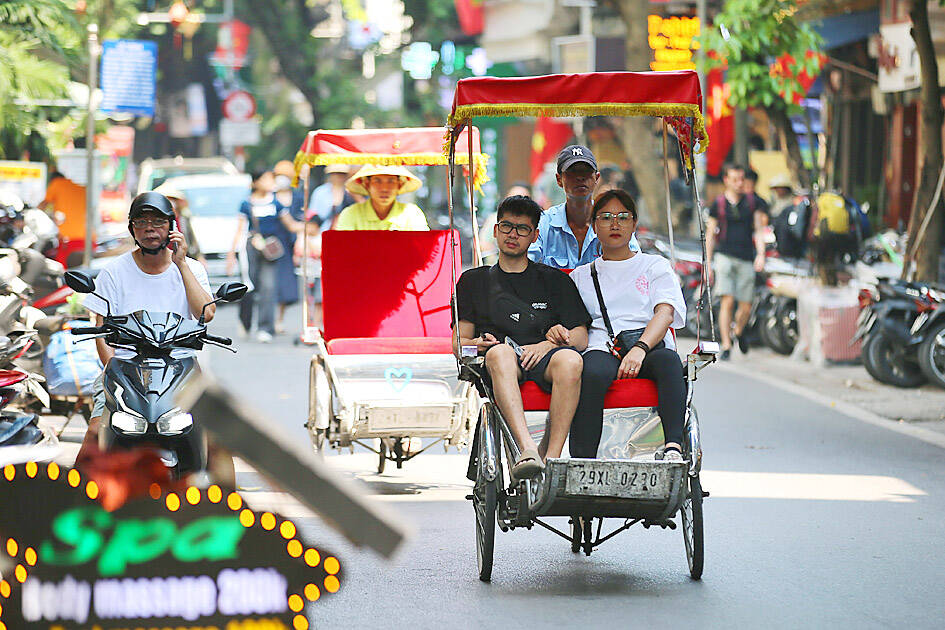Vietnam’s economic growth unexpectedly accelerated last quarter, buoyed by manufacturing and exports before a super typhoon last month caused widespread damage and prompted warnings of a challenging end to the year.
GDP rose by 7.4 percent in the three months ended September from a year earlier, the General Statistics Office (GSO) of Vietnam said yesterday. That compares with a 6.1 percent median estimate in a Bloomberg survey and a revised 7.09 percent expansion for the second quarter.
Vietnam’s economy has shown resilience this year as investment pours in, with Vietnamese Prime Minister Pham Minh Chinh vowing to cut logistical costs and improve infrastructure.

Photo:EPA-EFE
The government has sought to pull in capital from foreign tech giants such as Samsung Electronics Co and Intel Corp as the country emerges as a viable alternative to China in the production of electronics, from smartphones to basic semiconductors.
Investment and industry, especially manufacturing, were among “the driving forces for growth” in the third quarter this year, the GSO said.
Big gains in agriculture and other sectors in July and August helped limit the effect of serious damage to crop output from Super Typhoon Yagi last month, GSO head Nguyen Thi Huong said.
Yagi battered Vietnam’s northern provinces, killing hundreds and wreaking economic damage that is estimated at more than US$3 billion. Factory activity in the trade-reliant economy contracted for the first time in five months last month, reflecting the severity of the storm, according to an S&P Global purchasing managers’ index report.
The government’s latest GDP growth target of 6.8 percent to 7 percent for this year would be “a big challenge” as the impact of Yagi, geopolitical tensions and global economic concerns weigh on expansion, Huong said at a briefing in Hanoi.
Authorities earlier predicted a hit of 0.15 percentage points to this year’s growth.
The State Bank of Vietnam might “turn more dovish” by lowering interbank interest rates to aid the economy after Yagi, Mitsubishi UFJ Financial Group Inc said.
The IMF expects Vietnam to grow 6.1 percent this year, slightly faster than its previous estimate, supported by “continued strong external demand, resilient foreign direct investment and accommodative policies,” it said on Sept. 27.

When an apartment comes up for rent in Germany’s big cities, hundreds of prospective tenants often queue down the street to view it, but the acute shortage of affordable housing is getting scant attention ahead of today’s snap general election. “Housing is one of the main problems for people, but nobody talks about it, nobody takes it seriously,” said Andreas Ibel, president of Build Europe, an association representing housing developers. Migration and the sluggish economy top the list of voters’ concerns, but analysts say housing policy fails to break through as returns on investment take time to register, making the

‘SILVER LINING’: Although the news caused TSMC to fall on the local market, an analyst said that as tariffs are not set to go into effect until April, there is still time for negotiations US President Donald Trump on Tuesday said that he would likely impose tariffs on semiconductor, automobile and pharmaceutical imports of about 25 percent, with an announcement coming as soon as April 2 in a move that would represent a dramatic widening of the US leader’s trade war. “I probably will tell you that on April 2, but it’ll be in the neighborhood of 25 percent,” Trump told reporters at his Mar-a-Lago club when asked about his plan for auto tariffs. Asked about similar levies on pharmaceutical drugs and semiconductors, the president said that “it’ll be 25 percent and higher, and it’ll

CHIP BOOM: Revenue for the semiconductor industry is set to reach US$1 trillion by 2032, opening up opportunities for the chip pacakging and testing company, it said ASE Technology Holding Co (日月光投控), the world’s largest provider of outsourced semiconductor assembly and test (OSAT) services, yesterday launched a new advanced manufacturing facility in Penang, Malaysia, aiming to meet growing demand for emerging technologies such as generative artificial intelligence (AI) applications. The US$300 million facility is a critical step in expanding ASE’s global footprint, offering an alternative for customers from the US, Europe, Japan, South Korea and China to assemble and test chips outside of Taiwan amid efforts to diversify supply chains. The plant, the company’s fifth in Malaysia, is part of a strategic expansion plan that would more than triple

Taiwanese artificial intelligence (AI) server makers are expected to make major investments in Texas in May after US President Donald Trump’s first 100 days in office and amid his rising tariff threats, Taiwan Electrical and Electronic Manufacturers’ Association (TEEMA, 台灣電子電機公會) chairman Richard Lee (李詩欽) said yesterday. The association led a delegation of seven AI server manufacturers to Washington, as well as the US states of California, Texas and New Mexico, to discuss land and tax issues, as Taiwanese firms speed up their production plans in the US with many of them seeing Texas as their top option for investment, Lee said. The